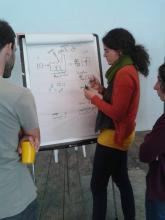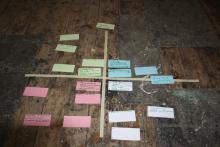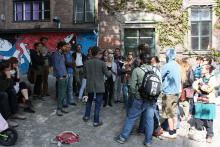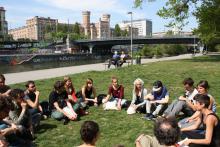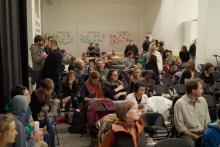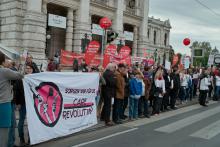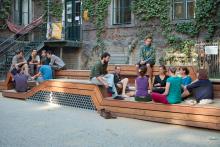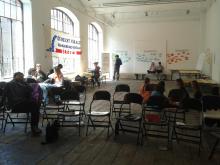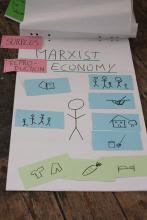Work in a solidary degrowth society
Why „work“?
What is work? In our present society work is very strongly associated with wage labor or employment. Work is what somebody agrees to pay you for. But is this so? What is with all the activities that are essential for the well being of all. Why is are activities sometimes paid for and sometimes not? Care? Education? Cooking? Love? Friendship? Nature? Some activities that are labled as work (and well paid) seem to be meaningless, even socially or environmentally destructive. Why is this so and who decides about this this?
These questions, along our own rather unconventional work-relations (as collective low-input farmers and half-time worker and father) led us to the decision to organize a course about the perspectives and questions around work.
Why is it so important to question the concept?
Work seems to be one of the most important concepts of social and political life. What we work, what we earn money with, became one of the most important characteristic of our identity. The question „What are you doing?“ does not ask for how many children you have, if you are a good listener, wheather you enjoy nature, but what you do for employment. Without work you are nothing, you are redundant. Unemployed people often end up in an identical crises. A whole economy appeared to keep people busy, putting them into courses or badly paid jobs. The meaningfulness of these measures is often questionable.
Work appears to be strongly connected with growth. Growth creates jobs! - Constant growth is needed to outbalance the increase of economic productivity and to keep the „redundant“ laborforce occupied. And people seem to need occupation. In political discourse workplace is one of the strongest agruments to keep dirty economies, such as the coal industry, running. But why keep this wheel of destruction turning?
In a society which is not dedicated to growth also the concept of work has to be reassessed. I we want to stop the massive extraction and use of resources, the production of useless products and the emission of toxics and carbon dioxide we will loose many jobs. On the other hand, there will be tasks in society that have to be taken care of, such as food production, care work, construction work, logistics etc. It will have to be organized who will take care of these tasks and under which conditions. It will have to be discussed which work is needed in society, what should be produced and how, if specialists are wanted or all-rounders or both, which work is seen as important and meaningful and how this is valued... Hence, althought full employment cannot be the goal anymore, there will be full occupation – or full activity.
Alternative concepts from the degrowth movement
As there is this strong connection between work and growth, alternative concepts and practices necessarily appear in the degrowth movement. Many practices, such as sharing, reusing or DIY (do it yourself) make the production of certain goods unnecessary. When we deny growth, many acivities that only serve this goal cannot be seen as meaningful or have to be neglected, such as coal mining, but also others should be seen as unproductive (for the common good and well being) such as hedge fond managing etc.
Work can be organized collectively, such as collective farming and community supported agriculture (see chapter on agriculture). One of the most known concepts, which can be seen as an umbrella term for many forms of alternately organized work, such as for-free-shops, food-coops, bike-repair-shops etc, is that of solidary economy (see chapter solidary economy).
What did we do in the course?
The course took place in the "Werkstätten- und Kulturhaus" (WUK) in Vienna. The former locomotive factory is one of the biggest independent cultural centers in Europe. It is the home of a kindergarden, a primary and a comprehensive school and provides space for 150 selforganized cultural and poltical groups and initiatives. Here people try different forms of learning and working together, so we found here the perfect place for our topic.
We had one big room for the whole duration course, where we could pin flipcharts and postits to the wall, where we could eat, drink coffee and have a short nap on one of the couches. We were able to use a tent in the big yard of the WUK to have our cook Sami to cook our daily meals. As the weather was very summerly most of the days, we could sit outside for the meals and for the coffebreak but also for the group works. We found the WUK a very good place as it enabled us to spend a lot of time outside, althought being in the inner city, and to move a lot between different locations.
In our course we tried to approach work from different perspectives. We therefore divided the time we had in four slots, four workshops, each of which lasted half a day, four hours in the morning or afternoon.
In the first workshop we tried to deconstruct the concept of „regular work“. What does this term mean, does this „regular“ work actually exist and since when and will it remain like this in the near future?
In the second workshop we were looking at work from a social-ecological perspective. We questioned which work is done, by whom and what are the effects on social relationships, society and nature.
In the third workshop approaches from feminist economy were presented, and questioned of how which work is acknowledged and valued.
In the fourth workshop different utopias regarding work were presented and discussed. We where asking ourselves how do we personally want to live and work in a future solidary degrowth society and how it could be organized that way.
In between these slots we had one guided city tour around Vienna, presenting central characteristics of the city regarding work, such as locations of early women labour struggles, social housing for workers in the 1920s etc. Furthermore we showed the movie „Frohes Schaffen“ with a following panel discussion as a public event.
Workshop 1: what is „regular work“?
Introduction
The concept of work as it is often understood - as paid labor - is not a universal one. Only in Europe of the 18th century the concept of work appeared in the connection with productive performance, a factor of production that can be measured by economic means. „Work“ became the source to make added value, to create growth (see Komlosy for an elaborate overview over the history of the concept of work). Before and for a longer period in many indigenous societies there was no general term for „work“ as an abstract category but rather for concrete activities. First with colonialism and „modernization“ and especially with a global neoliberalization also the concept of work became globalized.
Aim of the workshop
In this workshop we tried to deconstruct the term „regular work“ as paid labor and full employment. The workshop aimed to question what actually is „regular work“ as a social relation, if it still exists and wheather it will in the future. It tried to explain the historical circusmstances of its evolving and look at present critical points, such as high unemployment, precarious jobs, the problem of division of labor between genders... It gave an overview about critical perspectives, mainly critisism of neoclassical economy and perspectives from feminist economy (see also next workshop).
What we did
This workshop was a combination of theoretical inputs about the historical development of the relation which is nowadays seen as „regular work“ as well as some critical perspectives on this understanding, e.g. from feminist economy, and group discussion. There was a powerpoint presentation (see material), with only keywords, that allowed for questions to and statement from the audience.
Reflection
The group was with 25 people weigh too big for this kind of method. The presenter had a very quiet voice and there was not enough time for all participants to make their comments.
Also, because of time constraints, many points were touched only very roughly, and could not be discussed sufficiently or to satisfy the participants. There was already a lot of knowledge within the audience that could have completed the theoretical content but could not be heard. Sometimes there was even disagreement that could not be solved adequately.
BOX: Movie „Frohes Schaffen“
The title of this docu-fiction movie can be translated as „happy producing“, which in German is a saying to wish somebody good luck or success, with the subtitle 'film to decrease the work ethic“. The movie by german regisseur Konstantin Faigle shows that modern society is not free from misbelief and mental coercion but that it created its own even religion like constrain – which is work. Work structures the day and gives life a meaning. But what meaning? The movie questions in a very satirical way the promise of happyness the religion capitalism with its mantra work gives us.
The movie addresses a lot of aspects that can be used for discussion. It is originally in German but with many speakers from English-speaking countries, such as the economist Jeremy Rifkin or Benjamin Hunnicutt. The DVD has also English subtitles.
Statement by Michael
Particularly in German language this is a puzzling thing as work is divided from leisure, paid work separated from playing. Consequently, the often negative connoted meaning of work is also in my very personal mindset. Grief work, personal work, energy work, gainful occupation – any kinds of efforts to change the status and to grow, but not everything has value, or does it?
Workshop 2: A social-ecological perspective on work
Introduction
According to Marx there is a differenciation between those who own the means of production (capital, machines, tools etc.) - the capitalists - and those who only own there own labour force. Striving for profit, for the accumulation of capital, capitalists tend to lower the costs for the labour force as low as possible. This leads to lowest possible working standards, e.g. security, but also low participation of workers in the organization of work. The same holds for the environment. Where standards raise the costs, they are likely to be avoided. In our present globalized world workplaces are moved to areas of the world where workforce is cheapest and standards are lowest.
This development means high pressure on society (e.g. because of high enemployment but also a high number of precarious jobs and high unequality), on the human being (because of little right to co determination, high pressure because of competition, overload and burnout vs. Redundancy, exploitation and even slavery) as well as the environment (e.g. massive extraction of ressources, pollution and high CO2 emissions).
Aim of the workshop
The subordinate questions in this workshop were: what is this work that creates growth? What does this mean for working conditions here and in other countries, ecpecially in the global south.
The aim was to understand that there is a strong interlinkage between labor and growth. When we want a world without growth, to divide the labor we have presently is not enough. We have to ask and decide collectively which activities are socially necessary and meaningful and how this could be organized. Most possibly there will be less employment, but (regarding the need for less mechanisation and less input of ressources) more work!
What we did
In this workshop we tried to develop a social-ecolgical perspective on different sectors of the society: agriculture, education, IT, mining, car industry, health sector...
The questions were: who is doing the work? Where does it take place? Under which conditions (how, how much time, why)? What are the social, personal and ecological consequences of the orientation towards profit / growth? What would change if profit was not the primary driving factor? / How could this area look like in a solidary degrowth society?
We split into small groups. every group working on one sector. After 30 minutes every group presented their results to the audience.
Reflection
In the beginning of the session we presented one model imaging the interaction of the social and the natural sphere from the Viennese Social Ecology, to give an idea what a social-ecolgical persoective means. Clear enough there was a lot of argument about this clear simplification of interrelations. Although it was a very interesting debate about what is social and what is natural and if this distinction can be made at all, we lost a lot of time to this discussion which we then missed for the group work. This part should therefore be left out and we do not explain it here further.
There was already a lot of knowledge among the participants. The advantage of the selection of different sectors was that participants could choose the sector they were interested in or even already had work experiences in. However, there was more need for discussion and exchange. This workshop could take one whole day on its own, splitting the workshop into two parts, one for discussing the status quo and one more utopian on possible organization in a solidary degrowth society, eventually having small inputs of content in between.
BOX: Ivan Illich, conviviality and the division of labour
The present high division of labor results in a high division of knowledge and ability of producing tools and other products of use, e.g. between those who design and understand technology and those who buy and use it. Those who have the knowledge and / or own the means of production have the power to either exclude others from their usage (e.g. from certain types of medicine) or reduce the circle of users, e.g. by selling it very expensive. As a counter conception the austrian philosoph Ivan Illich coined the term conviviality as an integrated and shared use of technology by everyone and without the need for experts that control them, the freedom to produce, exchange and use the goods one needs. Conviviality decreases dependency and thus increases autonomy.
To give an example from agriculture: In austria it is obligatory for farmers of greenland to have the soil of their fields analyzed regularly. The complicated analysis is deligated to privat institutes (experts) and is very expensive. Those institutes inform farmers about the quality of their soil and give them recommendation for fertilization and other measures. However, the result is only a number and a mean of the sample and does not really help the farmer to understand what is going on in his field. A convivial tool for farmers would be to know the different species of plants growing in their meadows which give hints about the pH value and other abundances or shortages for every little spot of their field. Everyone could do that, the knowledge is available and it does not cost a cent. It allows for individual and adjusted and thus sustainable measures.
Workshop 3: Critical Perspectives from Feminist Economy
Introduction
This workshop focused on a feminist perspective on work. Feminist economics critizise that working restrictions for women contributed to the economic dependency of women and led to a gender specific division of labour and to a social division of society, into a productive and a reproductive, a public and a private sphere. The biggest part of the work that is done in the latter – what is often described as care work – caring for children, elderlies, ill people – is mainly done by women, in the household and without payment. This work is not considered as work in classical economic theories. It remains invisible, for the public and especially for statistics. For feminist economics reproductive work is not immediately producing surplus but is essential for the preservation of the society. Therefore, they critizise the onesided valuation of work.
Furthermore, care work has a different logic of time. The expenditure of time for another person is an essential aspect of care work. Rationalisation or an increase in efficiency – in the sense of producing more output within the same time or producing more surplus by reducing the expenditure of time per unit – is limited. Commodification of care activities means that care work is redistributed through the market or through the state - for example by establishing childcare facilities. When care work is transformed into a commodity it gets a price which is determined through supply and demand -, and it can be traded. An example here is if well situated families transfer domestic work to other - most often migrant - women. This process very often goes hand in hand with unequal power relations and exploitation. Hence, a central point of the feminist debate around work, especially care work, is how it could be valued differently and how it could be organized or reorganized so that it is shared more equally.
Aim of the workshop
The workshop tried to give an overview over central criticism from the feminist economy of the classical economic understanding of work and to introduce alternative feminist concepts of classifying the different facettes of activities. It aimed to question the apparently obvious differentiation into productive and reproductive work to further questioning the meaningfulness of the current valuation – in terms of money and public recognition - of all these activities.
What we did
The workshop was divided into two blocks, each of them divided further into one part of theoretical input and one of group activity and reflection.
In the first block we provided some basic information on feminist political economy and feminist critique on common economic theories. Also, the main aspects of feminist critique of Marxism was discussed. To reflect the given theoretical input we did a group activity based on the 4-in-1- perspective. The 4-in-1-perspective is a concept by Frigga Haug which aims to redefine work or being active and to understand it not only as wage labour but as a conjunction of four categories: wage labour (or rather overtaking societal necessary activities), reproductive activities, culture / identity formation and political participation. Within the group activity the attendants should discuss their daily activities (paid and unpaid, free time, etc.) in small groups of 3-4 persons and think about the approximate duration of these activities and how they feel about it, whether they like it, find it
awful or just necessary. After this the groups should associate their activities with the four categories of the 4-in-1-perspective which was drawn as a matrix on the floor and discuss the main aspects .
In the second block we dealed with current feminist discourses and alternate models of work. We started by outlining the feminist critique on the GDP, introduced current feminist concepts – e.g. the care economy – and talked about international implications of gender specific division of labour. In a group activity the attendants should write down concepts or topics on degrowth they already knew and reflect on gender aspects by considering questions like: is the household included in the concept?; Are some groups excluded from some activities/work?; Is the concept based on reproductive and productive work, or does it overcome this dichotomy? etc.
Reflection
The mostly positive feedback showed the importance of the topic and to deal with gender specific
aspects within alternative concepts. Especially the group activities were experienced as very positive. Some participants found it very beneficial to have been given the space to connect their own circumstances and activities with the discussed topics and reflect these with others. Others found it difficult to separate their activities in the given categories and said that their activities in many cases overlap, especially concerning wage labour and political and social participation. An interesting outcome was that many perceive their political and social involvement as work, even if not monetarily compensated, and sometimes find this burdening. Consequently many attendants said that it was interesting to separate their own activities into categories under consideration of its time consumption and being confronted with how they feel about it. Many concluded that they do not have enough time to ‘do nothing’ and stated that they were missing the category of ‘idleness’ or ‘doing nothing’ in the 4-in-1-perspective.
While originally the workshop intended to focus on the group activities and by this to work out alternative models of work and being active with consideration of feminist aspects, we spent more time discussing the theories. We extended the discussion to feminist critique of Marxism and the Marxist theory, as a high interest in and need for further information on these topics became apparent. Based on the feminist critique of Marxism, terms such as productive and reproductive work and activities associated with these were discussed, which revealed the differing logic and assumptions that are inherent in the current working conditions respectively the division of labour. Finally we concluded the workshop with an extended discussion of the 4-in-1-concept.
Workshop 4: Visions of work in a degrowth society
Introduction
In this workshop we tried to develop utopias how work could be organized and shared differently in a future degrowth society.
Aim of the workshop
The workshop aimed to give the participants a wider look on how reorganization of work relations would also effect all other parts of life, social relations and society. The presented utopias were thought to give a starting point from which everybody could develop their own utopia how they want to live and work in a future degrowth society.
What we did
The workshop started with a presentation of five different 'utopias', actual and partly well known ideas about the future. The first was a society after transition from oil dependency to local resilience as promoted by Rob Hopkins in his 'Transition Handbook'. The second utopia was a society of open high-tech subsistence, a world in which everybody would be able to fulfill their needs with help of open software and 3-D printing. The third utopia was that of commons, where natural ressources, knowledge but also emotions and personal problems would be commonized. Number four was the idea of cradle2cradle, of everlasting recycling of resources, together with new resources, e.g. proteins from insects and aqua culture, as well as new forms of energy generation. The fifth utopia was that of a world wide basic income for everybody, a world where everybody would give what they can and get what they need.
We then split into small working groups, choosing one of the five utopias and discussing following a number of questions - or rather keywords – (see material) how the world would look like following this imagination and how work, but also relationships and hierarchies, spirituality, nationality and cultural habits etc. would look like and be organized.
Reflection
Again, there was not sufficient time for the group discussions and the following presentation, However, this workshop was a nice exercise to wrap up and include subjects from prior workshops, such as reorganization of care work, the question of limited resources and energy etc. The relatively fix framework of the given utopias however, restricted a bit the creativity of the participants to think about their own utopian world.
Course-Reflection
We are all not experts on the topic. So we missed to have inputs about content or discussions that have been held in the degrowth discourse, such as the conference in Berlin, already. Therefore this course was may be too basic, of very low threshold.
The program was too dense. There was not enough time between the slots to have open discussions about the topics presented or experiences from the participants. Every person already has his or her own experiences with work, working under precary conditions, being unsatisfied with the job, having burnout, doing voluntary unpaid labour or housework and so fourth. There should have been more space for exchange regarding these experiences.
Statement by Constanze
I liked the discussions and group works regarding atmosphere and content always then, when there was a shared input beforehand. Then we had a common basis, where everyone could contribute something from there one experiences.
Statement by Michael
The degrowth perspective helps me for my personal growth, to find my way in between to do what I like but also to accept the current necessity to do something that is valued by society or at least some communities in order to obtain the basic needs of living like food and shelter.
The key is empowerment and to do what you like and to create some value for you or others. Personal growth instead of just economically one to create a world in that you want to live, a good live for all creatures.
Literature
English
Silvia Federici: Revolution at Point Zero: Housework, Reproduction, and Feminist Struggle. Essays from 1975 to 2010. PM Press.
German
Biesecker, Adelheid, Maite Matthes, Susanne Schön und Babette Scurrell (Hg.) (2000): Vorsorgendes Wirtschaften. Auf dem Weg zu einer Ökonomie des guten Lebens. Kleine - Verlag, Bielefeld.
Gorz, André (2007): Arbeit zwischen Misere und Utopie. Suhrkamp, Frankfurt/Main.
Gruber, Sabine/Haug, Frigga/Krull, Stephan (Hg.) (2010): Arbeiten wie noch nie!? Unterwegs zur kollektiven Handlungsfähigkeit. Argument Verlag, Hamburg.
Haug, Frigga (2009): Die Vier-in-einem-Perspektive. Politik von Frauen für eine neue Linke. Argumente Verlag, Hamburg.
Hochleithner, Stephan und Katharina Leitner (2011): Arbeit:ver:handeln. HammockTreeRecords, Wien.
Komlosy, Andrea (2014): Arbeit - Eine globalhistorische Perspektive. 13. bis 21. Jahrhundert. Promedia Verlag, Wien.
online sources:
http://www.krisis.org/diverse_manifest-gegen-die-arbeit_1999html
http://www.vier-in-einem.de/
http://www.frohesschaffen.wfilm.de/Frohes_Schaffen/Film.html
http://www.wuk.at/WUK/Das_WUK
- 1324 reads

